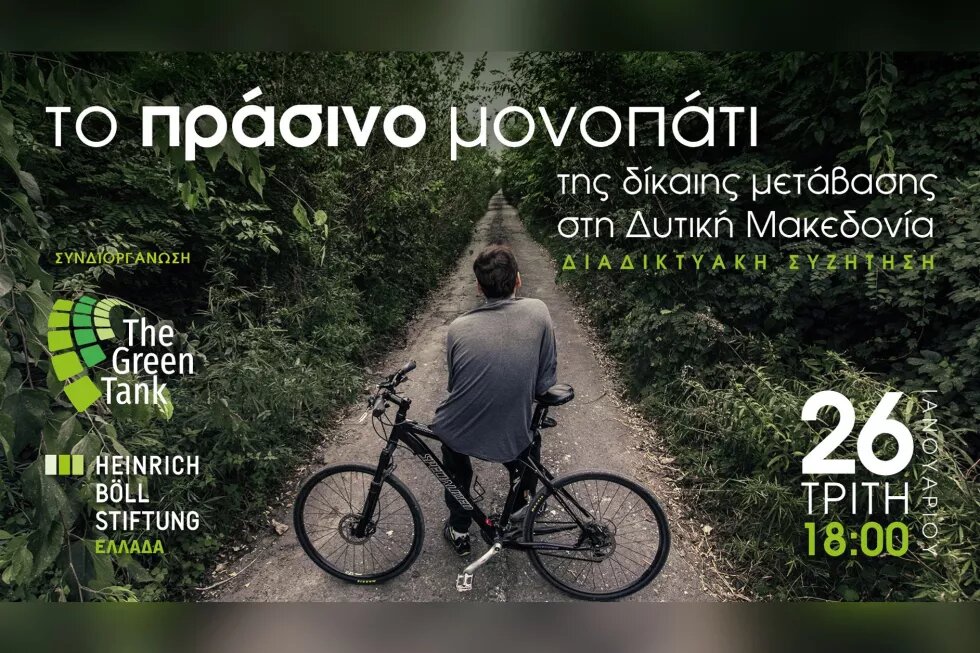The key importance of citizen participation in the Energy Transition being attempted in Western Macedonia was highlighted by the online discussion entitled The Green Path of the Just Transition in Western Macedonia, organized by the green think tank The Green Tank and the Heinrich Böll Foundation - Thessaloniki Office, Greece on 26 January with the participation of representatives of the local government, the local community and the academic institution of the region.

Opening the event, Ioli Christopoulou, founding member of Green Tank and Policy Coordinator, stressed that the compass on the difficult path of transition in Western Macedonia is the climate crisis as well as social justice. Green Tank has recorded the agony of the local society in the poll conducted with Professor Emmanouela Doussis, diANEOSIS and the polling company MARC, demonstrating the need for strong consultation institutions and participatory governance mechanisms. She also pointed out the contribution of the Green Tank in highlighting the history of the transition of the lignite areas of our country, as well as its specific characteristics, such as its relevance to the European framework and its lack of funding.
On behalf of the organizers, Michael Goudis, director of the Heinrich Böll Foundation, welcomed the partnership with Green Tank, which takes various forms, either articles, such as the one by Ioanna Theodosiou on the role of Energy Communities in the just transition, or interviews and videos on a number of critical issues for the country's energy future. He also touched on the importance of the event for the broader debate that the Foundation wishes to open up in Greece, regarding the creation of new long-term and sustainable perspectives for cities in the periphery that are experiencing challenges such as energy transition or a shrinking as former industrial/manufacturing centres. He addressed the need for a just and inclusive energy transition and commented on the role of the green space which was the first to raise the critical questions around this challenge, noting that it is now time to direct the answers.
Nikos Mantzaris, policy analyst and co-founder of The Green Tank, analysed in his presentation the reasons why lignite is a fuel of the past at global, European and national level. He stressed that Western Macedonia is starting the energy transition from a particularly unfavourable position compared to the other 96 European regions of the 27 that either burn/exploit coal, due to the deep dependence of the local society on lignite activity and the high unemployment rate. He commented on the European Fair Transition Mechanism and focused particularly on the positive and the weaknesses of the Fair Transition Plan (Master plan) of Western Macedonia, which, as he said, is far from being green and sustainable, and also made suggestions for improvement. He concluded his presentation by referring to the important documentation work offered by environmental NGOs and think tanks, as well as their role in terms of advocacy and technical support to local communities.
The ecological movement's constant demand and pursuit was and is the deconstruction of the myth of cheap lignite, said Lazaros Tsikritzis - Professor of the University of Western Macedonia and President of the Ecological Movement of Kozani. He also pointed out that the ecological narrative focused already since 2000 on calculating external costs and returning them through investments, thus laying the foundations for the idea of the Fair Transition Fund. In his presentation, he reviewed the historical mistakes and missed opportunities to phase out coal, demonstrating how the lack of political will, centrally and locally, social tolerance of the "vocal majority" and the slow and inadequate international response to the climate catastrophe resulted in valuable time being lost. Finally, he presented the conditions and proposals of the ecological space for the next day, underlining the need for consensus instead of party polarisation.
Lefteris Ioannidis - Former Mayor of Kozani (2014 - 2019), member of the Ecological Movement of Kozani, highlighted the role of local government and local stakeholders and in particular the importance of their participation in the process of productive transformation of a region. He conveyed the experience from the effort of building a group of local actors and the tangible results it brought about (European Mayors Forum, National and European Fair Transition Fund, cooperation between local government and PPC employees, etc.). He stressed that what is needed is not just consultation, but, even more importantly, the co-design of a common vision for the new productive model of Western Macedonia, as a guarantee of success and acceptance of the effort.
Dimitra Karagianni - Philologist, writer, editor and responsible for the events of the Intervention magazine added the social and human dimension to the path of just transition, as approached in the recent related online event entitled “"At my end is my beginning...", a narrative of transition in the post-lignite era”. Through a retrospective look at the past, she showed how the local community became trapped in the deadlock of lignite and came to experience a deep identity crisis today. She underlined the social implications of the loss of jobs due to their connection with people's self-esteem and social integration. Finally, she highlighted the need for cooperation and activation of social actors in order to exploit the region's unrecognised potential, focusing on the developmental role of the cultural sector, which can also contribute to the creation of a new profile for the region.
Watch the video of the discussion moderated by journalist Vasiliki Grammatikogianni.


